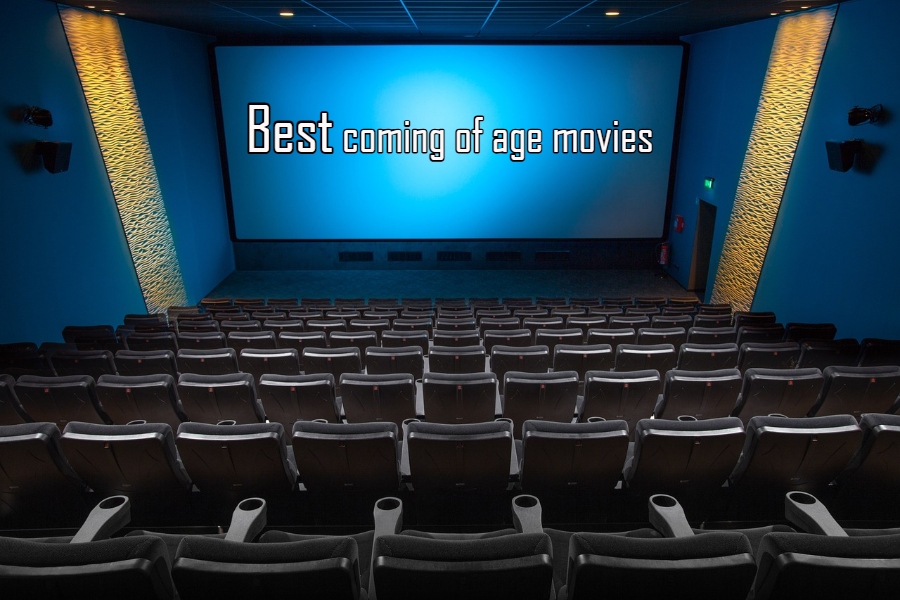Being a teenager is referred to one of the most complicated times in your life. It’s the era when so many big yet seemly small things happen such as getting your license, your first car, your first job, or first real relationship when you finally see each other outside of the hallways in school. Time makes you feel like being a teenager will last forever, but once sixteen hits soon eighteen will too, and it makes you look back at all you’ve done since walking in on your first day of freshman year. Many forms of media have tried to encapsulate the feeling you get once you realize you’re actually growing up, but nothing will do it as well as coming of age movies.
Coming of age movies are a form of film that is based around themes such as growing up, youth, and maturing (which is depicted by a character arc or development) often centered around a main protagonist who is “coming of age” or in other words is progressing to the next stage of their life which is none other than adulthood. These movies don’t always have to be gut-wrenching with heavy topics for example, Superbad and Donnie Darko are even considered a coming-of-age movies, but the best films are the ones that we can relate to. Whether you find that as a good or bad thing is subjective but movies we consider ‘comfort films” are usually the ones with a character we can see ourselves in and a story we might have lived through.
So, what coming of age films did the best job at representing the experience of growing up? This list will tell you just that.
- Perks of Being a Wallflower (2012)
Originally written by Stephen Chbosky and published 1999 then later adapted into a film in 2012, The Perks of Being a Wallflower follows the main character Charlie (played by Logan Lerman) who is a naive and socially awkward freshman in high school. Throughout the film we see Charlies struggles of being an unintentional wallflower as he’s coping with the suicide of his best friend and his struggles to connect with others as he attempts to find a group that he belongs to. Two seniors Patrick and Sam (played by Emma Waston and Ezra Miller) take Charlie under their wing, and they too begin to understand Charlie’s loneliness when he opens up about his best friend Micheal to Sam at a party.
“My best friend Micheal his dad was a big drinker, so he hated all that stuff, parties too.”
“Well, where’s Micheal tonight?”
That is a snippet of what really kickstarted the relationship we see develop between Charlie and the “wallflowers” along with his romantic relationship with Sam who is also struggling with her own unfortunate yet very real issues. The Perks of being a Wallflower encapsulates life outside of the traditional ideas of high school that we usually see in film, and it also does a great job helping viewers read in between the lines when we realize the real underlying issue toward the end of the movie which is absolutely heartbreaking. This film brings a sense of community and concern for others into its story which is what leads Charlie into his development as a character.
2. Moonlight (2016)
Directed by Berry Jenkins Moonlight is a story based around self-discovery and acceptance once those discovery are made. This film set in the 1980’s follows the main character Chiron during three crucial periods of his life which are early age, adolescence, and adulthood. Growing up in a crime ridden Miami neighborhood with a single drug addicted mother we see Chiron’s heart wrenching experiences of growing up in the situations he was placed in at birth. While hiding away from bullies in an apartment building young Chiron is discovered by Juan who happens to be a Jamaican drug dealer, and he takes him in and becomes a very complex version of a caregiver teaching him how to swim and also how to trust others which is pivotal to Chiron’s character development. Moonlight is an example of what happens to people when you persecute others. It causes them to feel as though they are less.
“What I’ve learned from working on Moonlight is, we see what happens when persecute people. They fold into themselves. And what I was so grateful in having the opportunity to play Juan was playing a gentleman.” This quote is from Mahershala Ali whose character may seem “bad” due to his method of income but is the most genuine character we see throughout Moonlight.
Chiron is the embodiment of a young, gay, black man growing up in an impoverished neighborhood who is also growing up in a cycle of bullying and abuse. The persecution of his community created a version of himself that represents the “toughness” a man has to show which is the opposite of the gentleness showed to him by Juan. Being a man and what it means to be one is a very prominent theme in Moonlight for example, we see Chiron and Kevin, who is his first love in the film, talk about crying and when Chiron asked if Kevin ever cries, he responded with no implying the embarrassment he feels when it comes to showing his own emotions around others. This theme bleeds into their relationship and the struggles they experience when showing affection to each other causing conflict between the two throughout the film.
The most heartbreaking thing about this film is its authenticity. Actor Alex Hibbert who played 10-year-old Chiron grew up in a neighborhood similar to that of Chiron and acknowledged the authentic portrayal the film created. Films like these hit the hardest when you stop and think to yourself that someone out there, even thousands out there, are living the same life as Chiron which brings up the importance of being there for others or being kind and genuine to those around you because the results of when you aren’t is a cycle of hurt that could easily be avoided.
“In my community, there’s people there that care for you, even though they do bad stuff, like, they sell drugs and stuff,” said Alex Hibbert when asked about his life in Miami compared to the film. “But, inside they care and have a heart.”
3. Mean Girls (2004)
Hot take? Maybe. But as far as unrealistic and over dramatic high school movies go, this one does it best. Originating from the book Queen Bees and Wannabes written by Rosalind Wiseman Mean Girls (Directed by Mark Waters) follows our lead protagonist Caty (Lindsey Lohan), who is a naive homeschooled girl from Africa, and her complicated friendship with the “Plastics,” who follow a set of strict arbitrary rules enforced by their leader Regina George and are followed by Gretchen and Karen who are your classic mindless followers that prefer popularity with Regina rather than genuine friendship. Mean girls is a comedic masterpiece that emphasizes the importance of being true to who you are rather than seeking approval from others during the four short years of high school. We see this with Caty who is welcomed to her new school by Janis and Damian who view themselves as outcasts and welcome her into their circle but soon Caty becomes involved with The Plastics and slowly begins to work towards the approval of them leaving Janis and Damian behind.
The pettiness of the plastic does in some ways hold true to the experience of a high schooler because of the way it makes light of the different cliques you always see in school such as: the losers, the preps, the goths, and the “jocks” (thankfully that word is hardly used now) which all respectively have their different interest but use that as a reason to only associate with the same few people from elementary school and stay separated from those who they think are different. Though Mean Girls is unrealistic like most movies are its true that small things at some point would become too much if it’s not taken care of or checked and shows how assumptions about others do cause harm as seen in the Plastics “Burn Book”. Catys obsession with Reginas downfall leads her down a path of becoming exactly like her which is “cold shiny hard plastic” as Janis would say.








